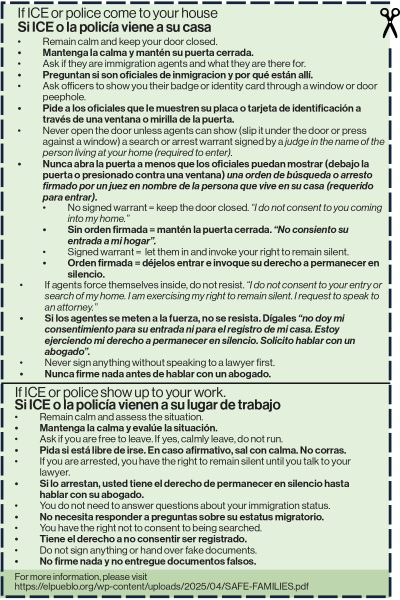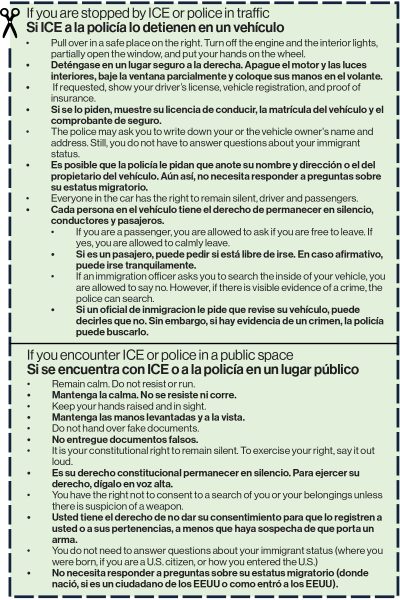With the increased national presence of the United States Immigration and Customs Enforcement, many people may be unsure about what actions they should take to stay safe. Various resources are available to community members in the High Country aimed at informing them about precautions and their rights.
Watauga County Immigrant Justice Coalition is a nonprofit that provides outreach opportunities and resources to communities with immigrant populations and offers a place where they can feel valued.
Some of the programs the coalition hosts have shifted due to recent events, such as changes in legislation that increase ICE’s jurisdiction and presence. One of these programs is the FaithAction ID Program, where individuals can receive IDs accepted by law enforcement, healthcare centers and more. This helps provide documentation with accurate information, such as the ID holder’s name and address.
The coalition also holds events where immigrant residents can engage with their community, sharing their culture with others and creating connections. But recently, attendance has declined.
“It’s really hard to get people out,” said a coalition board member, who requested to remain anonymous due to personal reasons. “The fear is so strong.”
The coalition has focused on staying up to date with recent legislation related to immigration, making sure to report the information back to community members.

Previously, local law enforcement agencies could opt into programs where they developed a partnership between their local jail and ICE officials. House Bill 10 mandated this partnership, requiring all local law enforcement agencies to comply directly with ICE agents. Former North Carolina Gov. Roy Cooper vetoed this bill, but it was overturned.
“We know that some community members have been affected by this,” the coalition board member said.
By enforcing the bill, verification status for immigrants would automatically be triggered if they are accused of any crimes.

House Bill 318 expands on the rules regarding a 48-hour ICE hold for detainees, which would go into effect after their scheduled release time. It also expands on the list of offenses that trigger verification status to class A1 misdemeanors. Additionally, ICE must receive a two-hour notification before the person is released.
Melinda Bogardus, treasurer and board member of the coalition, said the current administration previously agreed they would focus on detaining and deporting violent criminals.
“And what we’re seeing is that people who are not engaging in any kind of crimes, that are not a threat to public safety, are getting caught up — are getting deported,” she said.
Senate Bill 153 is another act of legislation that grants immigration officials more power and authority, and has been vetoed by Gov. Josh Stein. The bill shifts focus away from providing noncitizens with benefits and implements a method of citizenship verification in order to receive benefits.
It also grants law enforcement officers, like the North Carolina State Highway Patrol, more control over immigration-related matters.
“By making local law enforcement, Highway Patrol participate in these federal jobs, and doing ICE’s work for them, it takes away from their resources and their time to actually reduce crime,” Bogardus said.
She said this reduces safety in the local community and creates a deterrent for those wishing to interact with their local law enforcement.
“For example, in Watauga County, the police really did a good job, and the community did a good job of working together and building relationships, but those relationships are going to erode,” Bogardus said.
In turn, communities with larger immigrant populations are less likely to report crimes and inquire about receiving assistance, she said.
“That could deter people from applying for services that they really need, just because they’re afraid of being associated,” she said. “Maybe they have a cousin or a neighbor or somebody who doesn’t have legal authorization. People will not apply for this assistance. And that’s going to harm families and harm children.”
The location where an immigrant has the most rights is in their own home, the coalition board member said. If they find themselves having an interaction with an ICE agent, they should document the interaction and keep their door closed and locked throughout the entire process, opting to communicate through the closed door.
They also said a federal agent cannot enter a person’s home without a signed warrant from a judge — meaning that if a warrant is presented but is only signed by an ICE agent, entry does not have to be granted.
Outside of the home, the board member said it’s easier for ICE agents to “grab” people out in public and on the streets.
“I know people locally who do not want to go out and drive places, except where they absolutely have to go,” Bogardus said.
For the workplace, the board member said there are precautions business owners and organizations can take in advance when encountering ICE agents. Business owners should always be sure to document every encounter and have a designated private space with a locked door for their employees and clients.
As for students attending App State, Senior Director of Public Relations Anna Oakes wrote that students looking for guidelines or policies related to immigration can find information via the Office of General Counsel.
“Guidance on procedures for visits and information requests from federal or state agencies can be found on the Office of General Counsel website. App State complies with all state and federal laws, and the university regularly monitors updates in laws and policies related to international travel, visas and immigration,” she wrote.
Oakes wrote that additional resources are available for international students seeking support.
“At App State, we value the insights and contributions of our international students and employees, who help enrich our university community,” she wrote. “App State’s Office of International Programs provides information, resources, advising and other support to international students studying at App State as well as to students who are traveling for study abroad.”
Immigrants in the High Country can find resources and support through websites like El Pueblo, which contains an emergency guide for immigrants, and the American Civil Liberties Union provides resources for social rights, including immigration.


